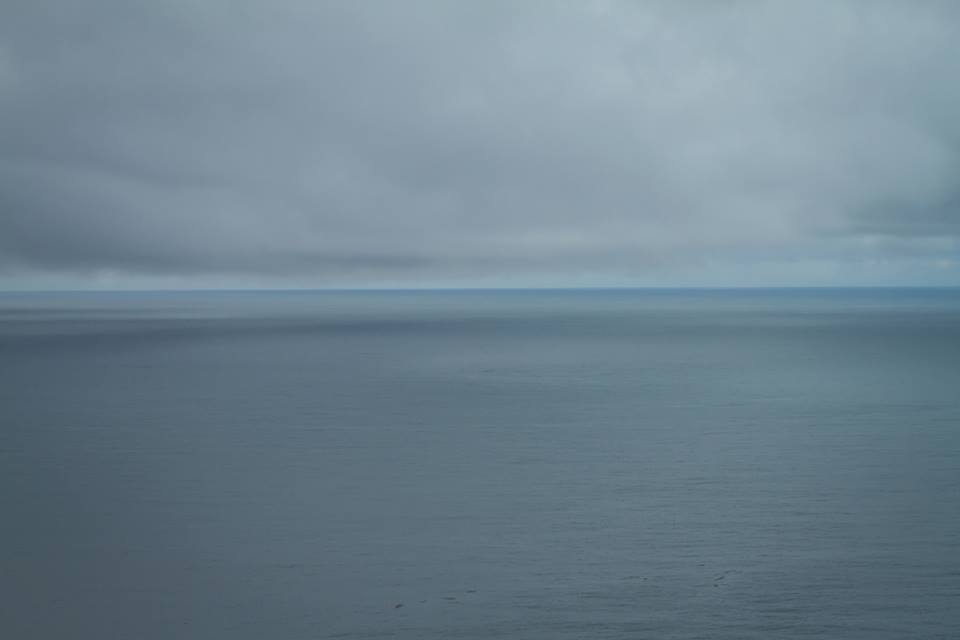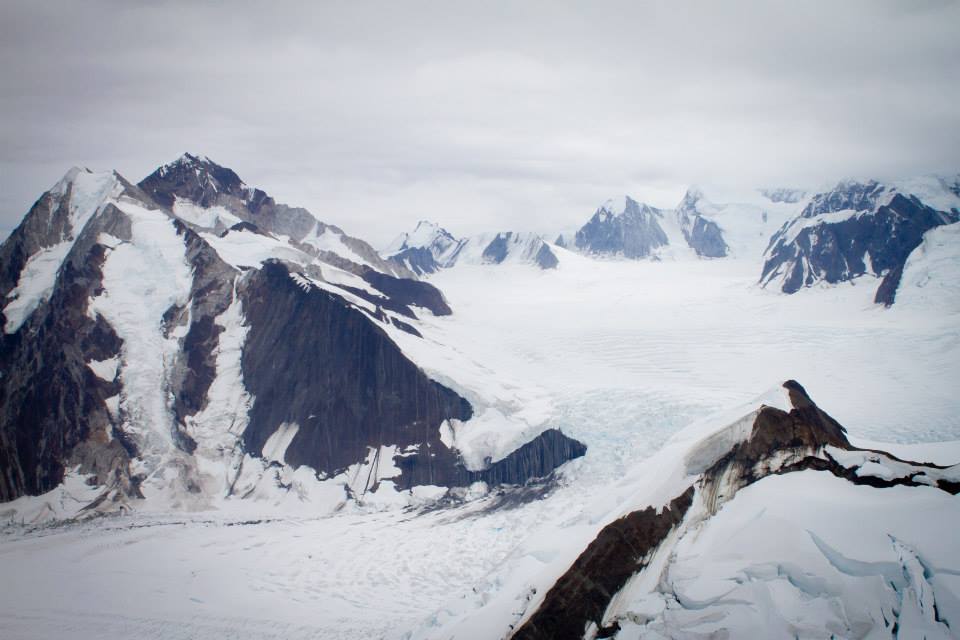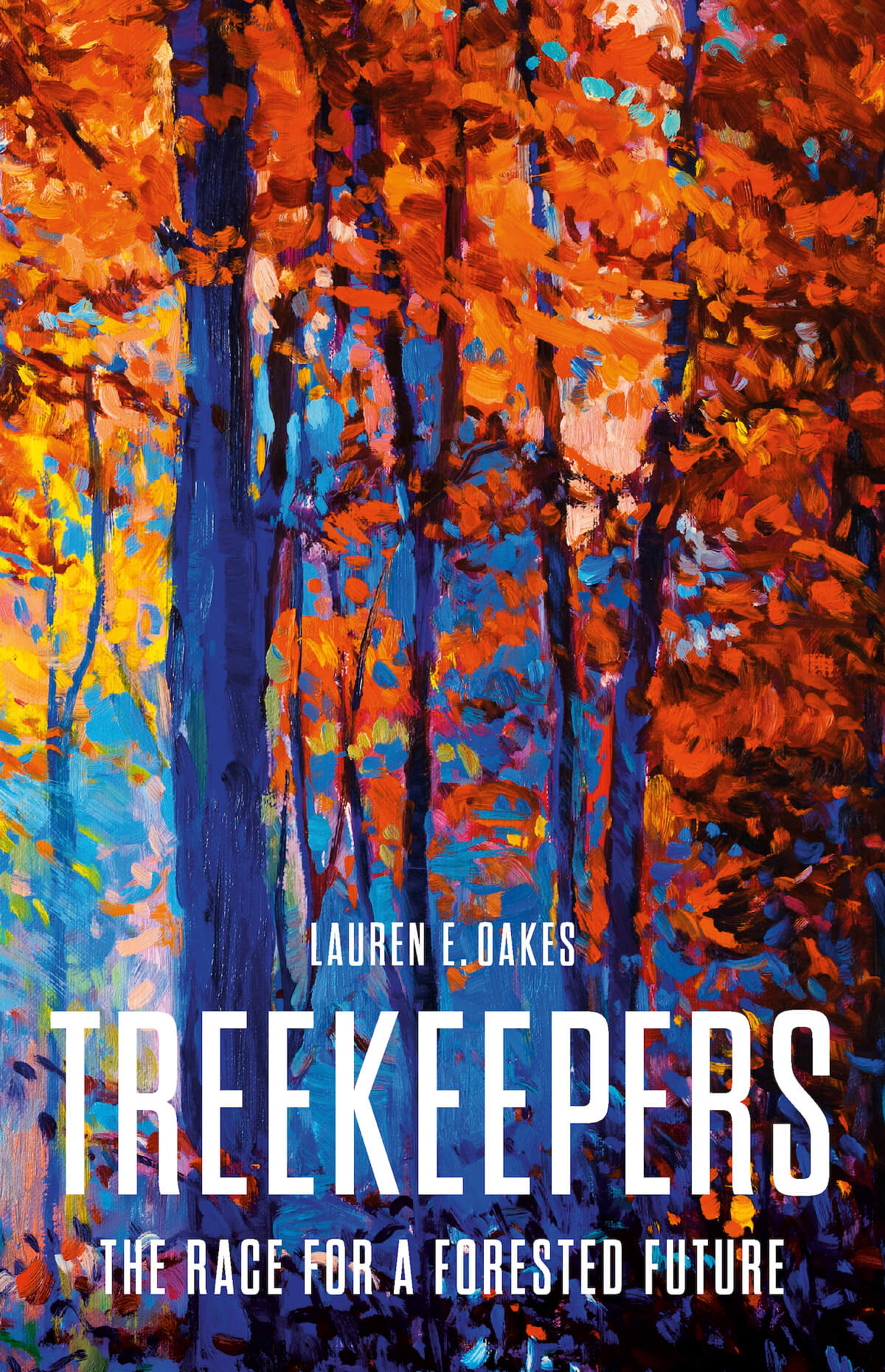Lauren E. Oakes
Scientist, Author, Educator.
I am a Conservation Scientist, an Adjunct Professor in the Dept. of Earth System Science at Stanford University, and a freelance writer. My first book, In Search of the Canary Tree, is a surprisingly hopeful story of a search for resiliency in a warming world. I am currently working on a new book, Treekeepers, about the science behind and legitimacy of the global reforestation movement.
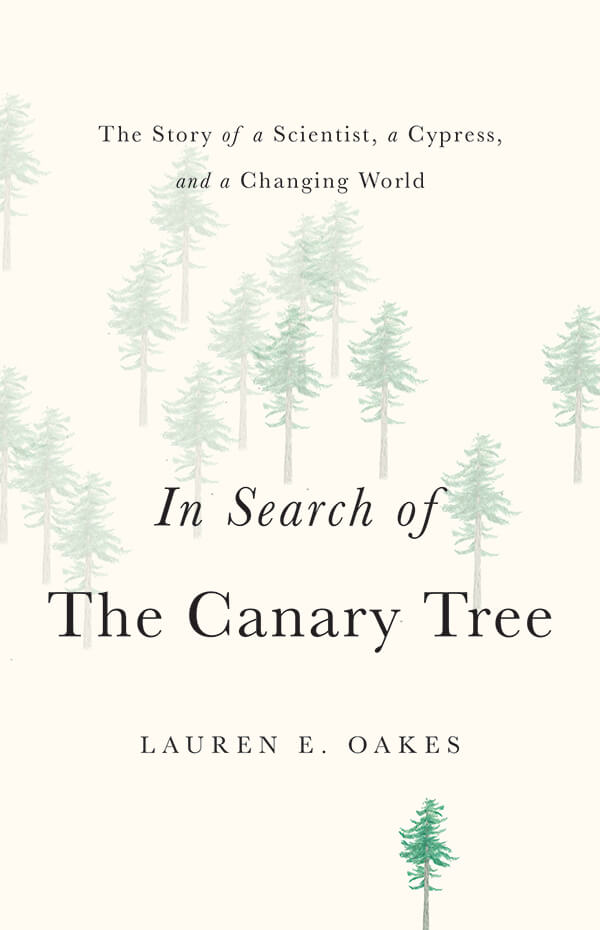
Reading with a class or a book group? Interested in reflecting on the story?
Second-Place Winner of the 2019 Rachel Carson Environmental Book Award
Finalist for the 2019 National Academies of Sciences, Engineering and Medicine Communication Award
IN SEARCH OF THE CANARY TREE: The award-winning and surprisingly hopeful story of one woman’s search for resiliency in a warming world
Order here! Or purchase at an independent bookstore near you.
Several years ago, ecologist Lauren E. Oakes set out from California for Alaska’s old-growth forests to hunt for a dying tree: the yellow-cedar. With climate change as the culprit, the death of this species meant loss for many Alaskans. Oakes and her research team wanted to chronicle how plants and people could cope with their rapidly changing world. Amidst the standing dead, she discovered the resiliency of forgotten forests, flourishing again in the wake of destruction, and a diverse community of people who persevered to create new relationships with the emerging environment. Eloquent, insightful, and deeply heartening, In Search of the Canary Tree is a case for hope in a warming world.
Recent Reviews — Kirkus, Publishers Weekly, Outside, Los Angeles Times, NPR, Shelf Awareness, Science, Chicago Review of Books, Open Letters, Buzzfeed, and more! Selected by Forbes contributor GrrlScientist as one of the Best Books About Climate Change, Conservation, and the Environment of 2018, by Science Friday as one of the Best Science Books of 2018, and by California State University, Chico and Butte College as the 2019-2020 Book in Common.
“A moving behind-the-scenes glimpse into the development of a young scientist as she searches for meaning and resilience in the face of great personal and global challenges.”—Forbes
“Oakes can really write. She weaves her musings about humans’ place in a warming world together with conservation science in a moving and effective way…A terrific book. Its message rings out clearly.”—NPR
“Beautiful, bracing, and even heartening. Oakes is a conservation scientist studying the imperiled yellow cedars of Alaska and her research leads her to ponder resilience in profound ways, from natural adaptation to human determination.”—Science Friday
“In a warming world, we need wisdom as well as knowledge; In Search of the Canary Tree is a rich source of both. Join Lauren E. Oakes in the fragile yellow-cedar forests of Alaska and discover not only how field ecologists do their work, but why.” —DAN FAGIN, Pulitzer Prize-winning author of Toms River
“We live in a moment of loss, and we are obligated not only to try and stop it, but to find the instances of resilience that can help us cope with that great tragedy. This book rises to the occasion!”—BILL McKIBBEN, author of The End of Nature
“Unique…Oakes has special appeal as a compelling new voice in science writing, and readers interested in trees, forests, ecology, and environmental issues will enjoy her intriguing work.” —Booklist
Bio

I am both intrigued and concerned by the ways in which people are rapidly transforming the natural world and the feedbacks those changes have on people. For some twenty years, the challenges between resource use and conservation have directed my attention from one place on this planet to another. I have witnessed communities transformed by oil and gas development in the American West and confronted other changes, such as mining development in Alaska’s salmon-bearing watersheds and road development through Chile’s coastal rainforests. I spent six years studying the impacts of climate change to forests in Alaska and how people adapt to the changes occurring in their own local environments. Now I work on advancing best practices in climate adaptation and implementation of nature-based solutions. I write because I love storytelling, and there’s a pressing need to make science and solutions to environmental problems more accessible to people across the planet.
I hold a dual-degree in Environmental Studies and Visual Art from Brown University, and I earned my Ph.D. from the Emmett Interdisciplinary Program for Environment and Resources at Stanford University. By training, I’m an ecologist and human-natural systems scientist, which means I consider people and “nature” as inherently linked; human and environmental health are intertwined. In addition to publishing my forest and climate-related research in peer-reviewed publications, I have contributed to media outlets, such as Scientific American, the Los Angeles Times, National Geographic, the New York Times, CNN, Literary Hub, and Emergence Magazine. My research has been covered by media outlets like The Christian Science Monitor, The Atlantic, and Outside. My first book, In Search of The Canary Tree (Basic Books, Hachette Book Group, Inc., 2018) is a story of finding faith in our ability to cope with climate change.

Photo: Clayton Boyd
Science & Action
In my research, I combine approaches from ecology and social science to understand the impacts of climate change and how people can adapt to climate change. I also advise organizations and companies on best practices in implementation of nature-based solutions—mainly in forest ecosystems.
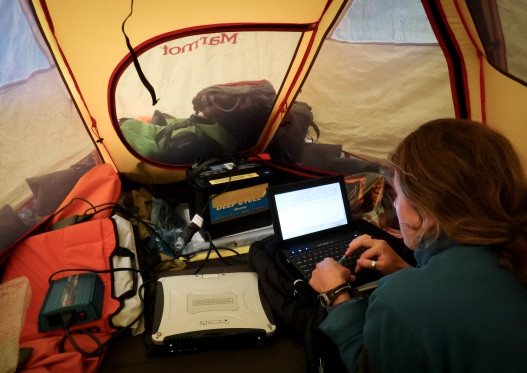
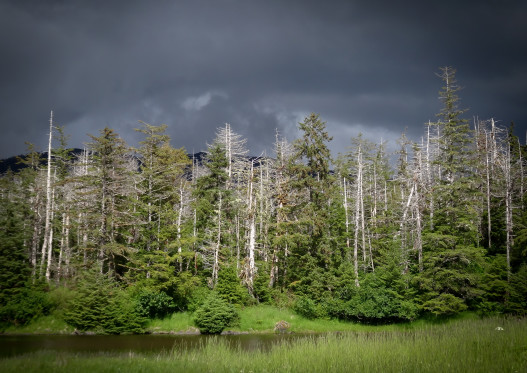
Elsen, P.*, Oakes, L.E.*, Cross, M., DeGemmis, A., Watson, J.E.M, Cooke, H., Darling, E., Jones, K., Mendez, M., Surya, G., Tully, E., and Grantham, H. (In review) Priorities for embedding ecological integrity in climate change adaptation policy and practice. *Co-lead author
Landis, M., Peterson St. Laurent, G., Oakes, L.E., Cross, M., and Hagerman, S. (In review) Assessing the emergence of a “renaissance moment” for conservation with increased recognition of social considerations.
Oakes, L.E., Peterson St. Laurent, G., Cross, M., Washington, T., and Hagerman, S. (2022) Strengthening monitoring and evaluation of multiple benefits in conservation initiatives that aim to foster climate change adaptation. Conservation Science & Practice.
Cross, M., Oakes, L.E., Kretser, H., Bredhoft, R., Dey, P., Mahoney, A., Smith, N., Tator, I, and Waseen, J. (2022) Tackling the research-implementation gap: Using coproduction to better inform decision-making in response to climate change in natural resource management. Environmental Management.
Peterson St. Laurent, G., Oakes, L.E., Cross, M., and Hagerman, S. (2021) Flexible and comprehensive criteria for evaluating climate change adaptation for biodiversity and natural resource conservation. Environmental Science & Policy.
Oakes, L.E. Cross, M., and Zavaleta, E. (2021) Rapid assessment to facilitate climate-informed conservation. Conservation Science & Practice.
Peterson St. Laurent, G., Oakes, L.E., Cross, M., and Hagerman, S. (2021) R-R-T (resistance-resilience-transformation) typology reveals differential conservation approaches across ecosystems and time. Nature Communications Biology.
Bisbing, S., Buma, B., Oakes, L.E., Krapek, J., and Bidlack, A. (2019) From canopy to seed: loss of snow drives directional changes in forest composition. Ecology and Evolution 00:1-18.
Bidlack, A., Bisbing, S., Buma, B., D’Amore, D., Hennon, P., Heautte, T., Krapek, J., Mulvey, R., and Oakes, L. (2017) Alternative interpretation and scale-based context for “No evidence of recent (1995-2013) decrease in yellow-cedar in Alaska” (Barrett and Pattison 2017). Canadian Journal of Forestry Research, 47:1-7.
Buma, B., Hennon, P.E., Harrington, C., Popkin, J.R., Krapek, J., Lamb, M., Oakes, L.E., Saunders, S., and S. Zeglen. (2017) Emerging climate-driven disturbance processes: Widespread mortality associated with snow to rain transitions across 10° of latitude and half the range of a climate-threatened conifer. Global Change Biology 23(7): 2903-2914
Oakes, L. E., N. M. Ardoin, and E. F. Lambin. (2016) “I know, therefore I adapt?” Complexities of individual adaptation to climate-induced forest dieback in Alaska. Ecology and Society 21(2): 40.
Oakes, L.E., P.E. Hennon, N.M. Ardoin, D. D’Amore, A. Ferguson, E.A. Steel, D. Wittwer, and E.F. Lambin. (2015) Conservation in a social-ecological system experiencing climate-induced tree mortality. Biological Conservation 192: 276-285.
Oakes, L.E., P.E. Hennon, K.L. O’Hara, and R. Dirzo. (2014) Long-term vegetation changes in a temperate forest impacted by climate change. Ecosphere 5:135.AP
Oakes, L.E. Forest ecosystems and human values of nature in a changing climate. In Beach, R., J. Share, and A. Webb, eds. (2017) Teaching Climate Change to Adolescents: Reading, Writing, and Making a Difference. Routledge. London, United Kingdom.
Oakes, L.E., Kelsey, E., and M. J. Brody. (2016) The fate of nature: Rediscovering our ability to rescue the Earth. Journal of Environmental Education, DOI: 10.1080/00958964.2015.1102697.
Oakes, L.E., (2014) Where we draw lines: policy and wilderness. In D. Bloomfield, Wilderness, pp. 109–113. UNM Press, Albuquerque, New Mexico, USA.Writing & Science Communication
I write about climate change, forest ecosystems, and solutions to environmental problems.
- The best books to inspire climate action. Shepherd. November 8, 2021.
- Qikiqtagruk: Almost an Island. Emergence Magazine. April 1, 2021.
- The vast viral world: What we know (and still don’t know). Nautilus/Science Philanthropy Alliance. March 29, 2021
- Forest clearing to greening, with dreams of future life. The New Farmer’s Almanac, vol. V: Grand Land Plan. Feb 1, 2021.
- The real cost of planting trees. Scientific American. January 29, 2021.
- How to plant the forests of the future. Anthropocene Magazine, Issue 5: Relocate. Summer 2020.
- Linking pandemics, global warming and environmental degradation all at once. CNN. April 22, 2020.
- Calculating the incalculable. Scientific American. April 14, 2020.
- The sink and the safeguard: Benefits of protecting and restoring intact forests for people and planet. Mongabay. September 25, 2019.
- Playing offense and defense on climate at the same time. Scientific American. August 26, 2019.
- Confronting flames, floods and more in a warming world. Scientific American. August 2, 2019.
- Adapting to climate change in Alaska. Scientific American. June 28, 2019.
- The scientists’ writing group: Finding community in a burning world. Literary Hub. December 4, 2018.
- What mass die-off an iconic tree species says about changing climate. National Geographic. November 27, 2018.
- The warming may be global, but the adaptation will need to be local. Los Angeles Times. November 25, 2018.
- Ghosts of ancient trees. National Geographic Open Explorer. May 14 – July 30, 2018 (series).
- Microbead skin cleansers can be bad for everyone’s health. San Francisco Chronicle. March 2, 2014.
- Humans and nature: can the gulf be bridged? New York Times, Green: A Blog About Energy and the Environment. September 13, 2012.
- Hunting for debris and answers in Alaska. New York Times, Green: A Blog About Energy and the Environment. August 28, 2012
- Snapshots in time: the dynamics of trees. New York Times, Green: A Blog About Energy and the Environment. July 23, 2012.
- Along a verdant shore: a vision of past, present, and future. New York Times, Green: A Blog About Energy and the Environment. July 11, 2012.
- In the wild, seeking an answer: what replaces dying trees? New York Times, Green: A Blog About Energy and the Environment. June 13, 2012.
- Episode 135: Species in pieces. Paula Poundstone. February 9, 2021.
- In search of the canary tree and other thoughts on resilience. Cultivating Place. September 5, 2019.
- A tree and its people in a warming landscape. Science Talk at Scientific American. April 22, 2019.
- In search of the canary tree. PRI’s Living on Earth. March 8, 2019.
- Amid environmental grief, finding hope in a graveyard of yellow cedar. KTOO-FM (NPR-Juneau). January 7, 2019.
- Watching the planet die: The “canary tree”. Jefferson Exchange. November 27, 2018.
- Saving vulnerable giants. UC-Santa Cruz Science Notes. November, 2017.
- Dispatches EP 01: The sound of climate change. Outside. September 20, 2016.
- Death by fungus, and other fun facts about fungal friends and foes. Smithsonian. August 26, 2015.
- Examining the effects of yellow-cedar decline. KCAW Raven Radio. September 16, 2013.
- Red Gold (2009). Winner of the Audience Choice Award, BANFF Mountain Film Festival; Audience Choice Award and Director’s Award, Telluride Film Fesitval.
- Alaska Gold (2012)
I am available to speak at public and private events, big or small. I’ve visited book clubs, given commencement speeches, and spoken to companies about nature-based solutions to climate change.
Teaching
I teach in both formal and informal contexts—from the University classroom in the sciences and science communications, to writing workshops and retreats, and field-based environmental courses. Here’s a sample of recent courses and workshops:
Writing for Positive Impact: Communicating the Climate Crisis—a year-long virtual writer’s group for climate writers and journalists, which culminated in a week-long, in-person workshop and retreat in Chamonix, France. Co-led with Emily Polk.
Coupled Human-Natural Ecosystems in Southeast Alaska—a 3-week field course at Stanford University focused on sustainability in fisheries, forests, energy, and tourism.
Interdisciplinary Environmental Science Writing Seminar—a PhD-level course at Stanford University focused on writing from empirical research for scientific publication.
Narrative Science and the Non-Fiction Book Proposal—a two-part workshop on the craft of non-fiction writing in the Environmental Science Communication Program at UC-Santa Cruz.
Press
Research-related Media:
- Bennett, S. (2017, Nov.) Saving vulnerable giants. UC Santa Cruz Science Notes.
- Tu, C. (2017, Feb. 7) “How to listen to data.” Science Friday.
- Mosbergen, D. (2016, Oct. 13) “The haunting sound of climate change over 100 years.” The Huffington Post.
- Kahn, B. (2016, Sept. 21) “Data, turned into music, reveals an odd scenario: death by freezing, in a warming world.” Scientific American.
- Kahn, B. (2016, Sept. 20) “This is what climate change sounds like, in D minor.” Climate Central.
- Nijhuis, M. (2016, Sept. 14) “The sound of climate change.” The Atlantic.
- Nijhuis, M. (2016, Sept. 7) “This is the sound of a forest changing.” The Last Word on Nothing.
- Rassler, B. (2016, Sept. 6) “The art of turning climate change science into music.” Outside Magazine.
- Andis, A. (2016, March) “Global warning: Exploring the contradictions of climate change in Southeast Alaska’s kingdom of ice.” Adventure Kayak Magazine.
- von Kaenel, C. (2015, Oct. 23) “Researchers turn to Alaskan locals for advice on protecting trees from warming.” ClimateWire.
- Gilman, S. (2015, Oct. 19) “Is the climate change-battered conifer moving northward?” The High Country News.
- Hinkley, S. (2015, Oct. 15) “How climate change is forcing us to rethink natural parks.” The Christian Science Monitor.
- Than, K. (2015, Oct. 15) “Climate change requires new conservation models.” Science Daily.
- Fresco, N., L. Krutikov, K. Timm, R. Winfree, B. Rice, J. Morris, and J. Geddens. (2014) State of change: climate change in Alaska’s national park areas. U.S. Department of Interior, National Park Service, Alaska Region: 13.
- Schulman, N. (2014, Feb.) “Extreme measures: In Alaska a new breed of scientists are using kayaks to aid ecological understanding and stewardship.” Adventure Kayak Magazine, pp. 45–52.
- Woolsey, R. (2013, Sept. 16) “Examining the effects of yellow-cedar decline.” KCAW Raven Radio.
- Woolsey, C. (2013, Sept. 11) “In water, forest, and lab, Stanford ‘SoCo’ examines Alaska’s natural systems.” KCAW Raven Radio. Sitka, Alaska.
- Treinish, G. (2013, July 30) “Sea lions, bears, salmon, and cedars: paddling in wild Alaska with a purpose.” National Geographic.

